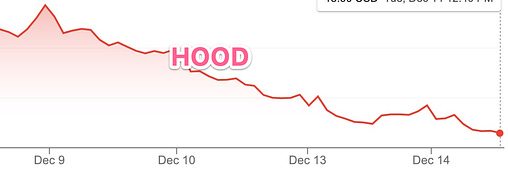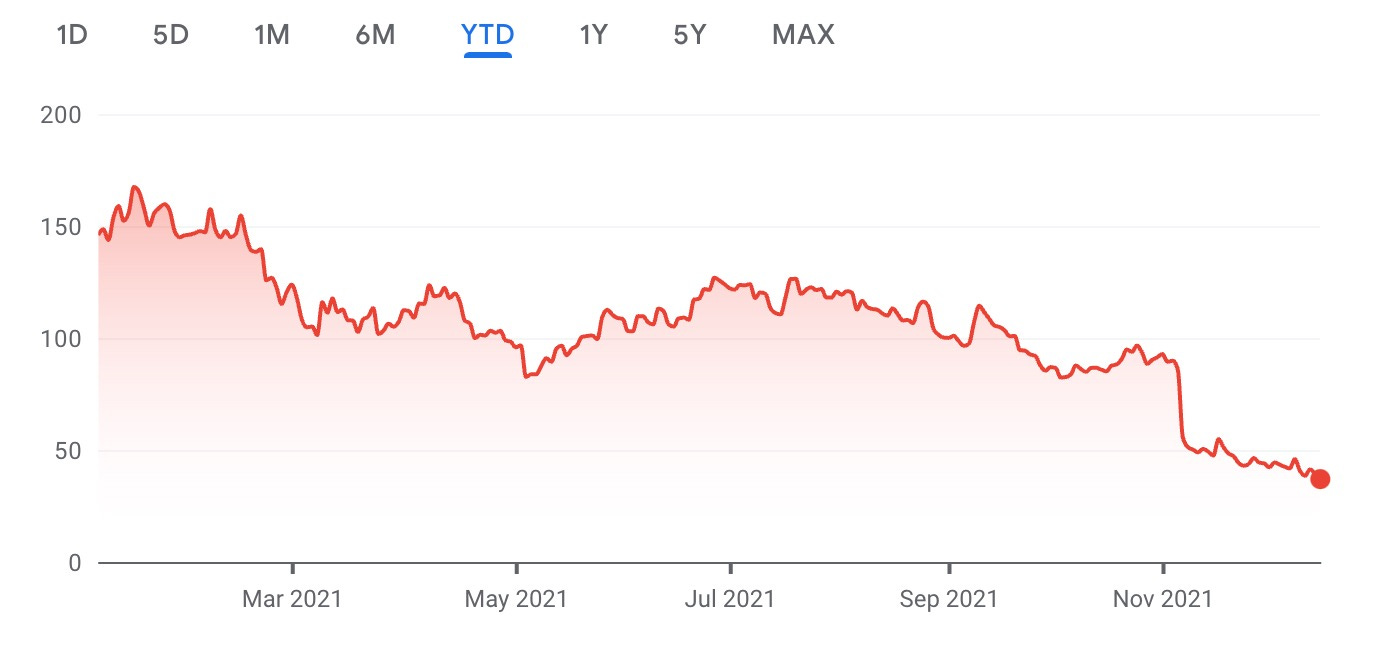Margins - Peloton, Valuations, and Innovation
Ranjan here with a warning: Today's newsletter has a Sex and the City spoiler. This will likely be the only time this happens in a Margins piece, but, hey, it's 2021. Things still don’t make sense. Let's talk about Peloton, valuations, and innovation. You may have seen the Sex and the City character Mr. Big died after riding a Peloton in the premiere episode of the show's reboot. It led to the inevitable headlines: Could the death of a fictional character directly affect the financial prospects of a multi-billion dollar consumer goods company? Before we start mixing our correlations and causations, let's take a quick look at few other story stocks over the past week (note - screenshots are from Wednesday): The past few weeks have been a wild ride down for all of the meme-y, growth-y pandemic story stocks. Something really feels like it's given way in story-stock land. Anyone who has been watching Peloton's stock knew this post-HBO loss of was just a blip in its larger collapse of nearly 70%: Peloton was the perfect pandemic story. We were all going to exercise from home and they were the innovative leader. They were a tech company. They were really, really cool. Longtime readers know I’m a huge fan of the product, but wasn’t exactly a believer in the stock. In November 2019, shortly before Peloton’s IPO, I wrote:
Okay, I was wrong. Like, really wrong. I was skeptical about a $4 billion valuation when Peloton were on track for around $900 million in revenue. In my meager defense, shortly after the IPO, the stock jumped to $35 and then collapsed to $19 right before the pandemic. There was a moment it seemed like Peloton might not successfully sell the 'tech company' narrative and be treated more like a retailer, and the financial markets would feel a bit conventional. Then the pandemic hit. And just like that….. Valuations and InnovationThe golden rule of investing is to never regret the money you didn't make. I'll admit, it was pretty tough to watch the stock of a company whose product you’ve very publicly proselytized shoot up. As the valuation skyrocketed to $48 billion, my skepticism of a $4 billion valuation felt pretty dumb. As Peloton stock has come back down to earth, I wonder how that stratospheric valuation and entire hype cycle impacted the company itself? What did those impossible expectations do to the company's strategy and culture? We all talk about big valuations as an unadulterated good. Headlines celebrate the numbers. Employees mentally calculate personal wealth. Everyone assumes the cementing of category leadership. Somewhere, a little Masa Son gets their wings. Valuations are theoretically extrinsic numbers that should only live within the capital and financial side of a business. A company's strategic and operational prowess should drive the stock price, not the other way around. But when very specific circumstances around a once-in-a-century event lift your share price from $19 to near $170, your company has to change. You need to start producing and selling a helluva lot more things. All of your organizational focus will likely move towards customer acquisition and production. Product development and user retention would naturally take a backseat. Sure, someone at the company would keep trying to do innovative stuff, but all the north stars would turn into getting new butts onto bikes. Peloton’s CEO John Foley essentially confirmed my suspicion:
In chasing those new butts on bikes, the company would have to divert focus away from keeping the old butts on their bikes. Also, getting too many new butts too quickly can result in bad butts. In its early days, Peloton could focus on acquiring the types of users that were likely to become sticky butts and keep using the product. But to make sense of that $48 billion valuation, the company would have to go after anyone who could sign up for Affirm. Did the valuation completely change the internal workings and strategic direction of the company? I write this as a somewhat disappointed user. I still uses the bike (admittedly, in spurts), but the core offering has not really improved in the years I've owned it. Back in 2018, I wrote how the competitive and group aspects of it were the most exciting part for me. Last summer, I started doing rides with a group from work. It was a fun quarantine bonding experience, but to ride together, we'd have to try to sign on at the exact same time, Slacking or calling each other to coordinate this. This was just one example of an area they could’ve introduced features to promote retention. But they didn’t. I even envisioned Peloton maybe revolutionizing personalized workouts:
(For those readers who think my co-host Can and I are a bit cynical, I’d like to submit this as a reminder that we can be huge tech optimists.) But nothing really improved. There's more types of workouts in the app and some tweaks to the biking UI, but overall the core biking experience has been stagnant. Did Peloton lose two years of product development by getting locked into impossible sales expectations? Did it provide an opening to not only biking competitors but also the Tonals and Mirrors and connected rowing machines of the world? Did they kill brand equity by acquiring the wrong new customers? Did they miss a huge chance to invent new ways to keep users motivated, the hardest challenge for anything related to exercise? I’m really intrigued if Peloton might’ve lost a longer-term opportunity around market leadership by trying to achieve something unattainable.  (note 2 on this video) Crashes and Company CultureThe impact of the stock price on the strategy was clear, but it's also important to remember the impact on the company culture. A 75% drop in a stock price seems pretty bad, but the stock is still trading at 3.5x revenue as of writing. That’s what makes this kind of stock price journey so intriguing. Nothing really changed. If you removed the roller-coaster the company has done…..fine. It’s quadrupled its pre-pandemic revenue. The stock is trading at a reasonable level. It has a bunch of assets in place that have potential. But from a company culture standpoint, I’m sure there are plenty of employees with options that are underwater. I have to imagine the jarring impact of hiring bursts and freezes will take a toll. The confidence of the average employee in the company might not be great, but this is also a brand I imagine employees love to work for. Can they culturally come back from this? But then, my goodness, regarding culture, this story about how Peloton canceled its holiday party because of the stock price, and then John Foley had a 'personal' party where he invited all the instructors but no employees, COME ON WHAT ARE YOU THINKING! In any other situation, this might come off as slightly out of touch, but for a company that feels like it’s facing an existential threat, it seems almost like a nail in its coffin (and honestly, just kinda creepy). That’s the thing about outsized expectations - mistakes like this feel much bigger. And just like that…It feels like the story-stock stories of the past two years are done. The days of ZIRP are behind us and a collapse of all the meme-growth-story stocks has already quietly begun. Seriously, look at the chart of any of the fun and crazy stocks you’ve paid attention to and so many of them are already down 30% or 50% off their highs. It’s happening. Right now, the most interesting question should be which of these companies will (or won’t) make it out alive. There's the famous story of Amazon stock dropping 90% before it went on to be the gazillion dollar company of today. Clearly, Bezos is one of the greatest business people of all time but the company also had very strategic practices in place (this is a good piece on how its cash conversion cycle helped it survive the downturn). Some companies will be well positioned to weather these storms. Peloton is an interesting one. It really did bring together media+tech+hardware in a way that blew my mind in 2017. But I'm not quite sure what the company is now. It’s still always a great workout. It is still a life-saver for a working parent. It’s still, I think, cool. Peloton, the product, is still fine. But will Peloton, the company, come back from this somewhat artificial stock market roller-coaster and still be Peloton five years from now? Note 1: I managed to write this entire piece without addressing the stupid Peloton "fastvertising" ad response to the Sex and the City death. That ad was an ad made by ad people to get ad people to talk about the ad. It screwed up the fourth wall for the show in a way that where I’m not even sure if Chris Noth died in the show. It was Ryan Reynolds' ad agency milking Peloton for cash after he did masterful work back with the Aviator Gin Peloton Wife ad. That was great. This was not. Sorry, maybe that is worth another post of just ranting about how bad that response ad was. Note 2: Writing this made me wonder the history of the NordicTrack company. It’s Wikipedia page is a good quick read. Mom-and-pop shop gets bought by a conglomerate that expands too quickly and declares bankruptcy, and is then bought out of bankruptcy and run well for nearly 25 years by a good conglomerate. Tale as old as time. If you liked this post from Margins by Ranjan Roy and Can Duruk, why not share it? |
Older messages
The Teenager Economy
Saturday, October 16, 2021
"I hate you! You don't understand me!"
Memestocks and Reddit redesigns
Monday, September 20, 2021
"You may be interested in...."
Advertising Stagflation
Sunday, August 1, 2021
Its the 1970s for digital marketers
Ape Armies and Investor Relations
Saturday, June 5, 2021
A boomer no-pants Zoom and 💎🙌
Grift is Good
Monday, May 17, 2021
Greed is so 1980s
You Might Also Like
Little Stream Software digest for the week of 2024-12-25
Wednesday, December 25, 2024
Hey there, Here's articles I published over the last week. - Eric Davis Merry Christmas Merry Christmas to you and your family. Hopefully you're able to take some well-deserved time off today
Use AI and protect your data
Wednesday, December 25, 2024
Today's Guide to the Marketing Jungle from Social Media Examiner... Presented by social-media-marketing-world-logo Next month is Artichoke and Asparagus Month, Reader! Are you a mayonnaise or
A reason to celebrate
Wednesday, December 25, 2024
Whichever way you celebrate the end of the year, my team and I would like to wish you Happy Holidays. Thank you for trusting us to be part of your marketing journey. Let's keep the momentum going
Don’t Write Another Newsletter Until You Read This
Wednesday, December 25, 2024
Why 1/5/10 Changes Everything
How they flipped a domain for $90k (in just 22 days!) 😱
Wednesday, December 25, 2024
You're invited to join in on all the fun! View in browser ClickBank Happy Holidays! TODAY, two of ClickBank's top vendors, Steven Clayton and Aidan Booth, have officially kicked off their 13th
The Gift of Leadership
Wednesday, December 25, 2024
From all of us at The Daily Coach, Happy Holidays!
Hack to define your key activation event
Wednesday, December 25, 2024
Inro, Qolaba, MySEOAuditor, ContentRadar, and SEO Pilot are still available til end of this week. Then, they're gone!! Get these lifetime deals now! (https://www.rockethub.com/) Today's hack
Polymarket, Sora, and The Hallmark Killer
Tuesday, December 24, 2024
What's on the top of my mind today?
ET: December 24th 2024
Tuesday, December 24, 2024
Exploding Topics Logo Presented by: Exploding Topics Pro Logo Here's this week's list of rapidly trending topics, insights and analysis. Topic #1 Perfume Layering (trends) Chart Perfume
10 Steps to Improve The Odds You Get Funded
Tuesday, December 24, 2024
And happy holidays from SaaStr! To view this email as a web page, click here saastr daily newsletter This edition of the SaaStr Daily is sponsored in part by Prismatic 10 Simple Steps to Improve The








